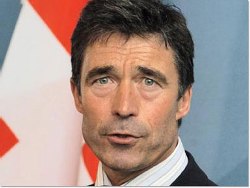ANALYSIS: NATO avoids image blow by sealing Rasmussen deal
 Strasbourg, France - Hours of wrangling, and the crucial mediation of US President Barack Obama, allowed NATO to pick a new secretary general and prevent the alliance from suffering an embarassing blow to its image on its 60th birthday.
Strasbourg, France - Hours of wrangling, and the crucial mediation of US President Barack Obama, allowed NATO to pick a new secretary general and prevent the alliance from suffering an embarassing blow to its image on its 60th birthday.
In the end, the summit's 28 heads of state and government agreed that Danish Prime Minister Anders Fogh Rasmussen was the right man to replace Jaap de Hoop Scheffer when he steps down at the end of July.
Rasmussen had headed to the gathering in Strasbourg and Baden- Baden with the conviction that he would get the job. But before he could get there, he had to overcome some fierce resistance from Turkey.
"The election of Rasmussen was unanimous, but there were important efforts to make sure that everybody felt included," Obama said.
"And I want to thank, in particular, Turkey for raising some concerns having to do with ... security issues, and their confidence that the new secretary general would address them," the US president said.
The process leading to the appointment of a new secretary general is a traditionally secretive affair.
This one was arguably the most public in NATO history, and it left divisions within the alliance dangerously exposed.
In the run-up to the summit, Turkish Prime Minister Recep Tayyip Erdogan had made it abundantly clearly that his country had serious reservations about Rasmussen.
He explicitly cited "considerable irritation" in the Muslim world over the publication by the Danish media in 2005 of cartoons deemed offensive towards the Prophet Mohammed, and the broadcasting from Denmark of Roj TV, a satellite broadcaster with close ties to the separatist Kurdish Workers' Party (PKK).
So it was all the more worrying that some of Rasmussen's most important backers - including German Chancellor Angela Merkel and French President Nicolas Sarkozy - seriously underestimated Turkey's resolve.
With the country's president, Abdullah Gul, leaving the doors open to Rasmussen during a recent visit to Brussels, Western ambassadors at NATO had wrongly attributed Erdogan's tough stance to local elections taking place in the country.
"They obviously misread the signals coming out of Ankara," one seasoned NATO observer present in Strasbourg told the German Press Agency dpa.
In the end, Turkey's approval came at a hefty price.
Sources close to the negotiations say Ankara will get the post of NATO deputy secretary general. It also received assurances from Obama that the US would support its fight against Kurdish terrorists, and a half promise from Rasmussen to shut Roj TV.
Perhaps even more importantly, Rasmussen would be expected to offer some sort of apology for the Mohammed cartoons when he visits Turkey with Obama early next week.
"We were pleased to see that our concerns were addressed and our wishes accepted," Gul said.
Rasmussen, for his part, said he shared Turkey's concerns and vowed to do "everything to achieve a good partnership with the Islamic world," including asking the Danish judiciary to look into the Roj TV affair.
Turkey is crucial to NATO because of its size, the strength of its army, and its strategic location as Europe's gateway to Asia.
It is also a vital ally as NATO's most important Muslim country. And NATO is understandably keen not to antagonize Muslims as it endeavours to eradicate radical Islam in Afghanistan.
Concerted efforts to convince Turkey also involved Merkel, Sarkozy and Italian Prime Minister Silvio Berlusconi, who even deserted a ceremonial walk across the Rhine River to negotiate with Erdogan over the phone.
But it was a two-hour bilateral meeting between Gul and Obama that eventually clinched it.
"With the tasks that we face, no one would have understood it if we had been unable to find an agreement," Merkel said.
Rasmussen, who will soon step down from his post as Danish prime minister, will now have to convince Turkey that it made the right choice.
NATO, for its part, may find itself having to reassure human rights activists that it will continue to defend freedom of speech, including the right of Westerners to publish cartoons that may be deemed offensive in the Muslim world. (dpa)